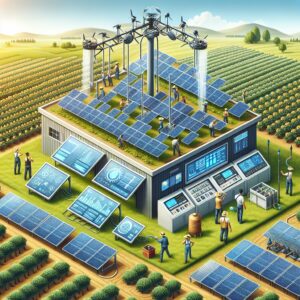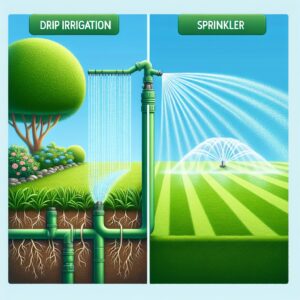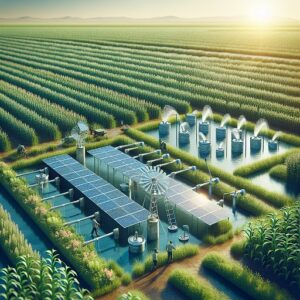
Key Takeaways
-
Understanding the role of batteries in solar systems is crucial for energy reliability on a farm.
-
Different types of batteries offer varying benefits and drawbacks for solar storage needs.
-
Choosing the right battery capacity is key to matching your farm’s energy consumption patterns.
-
Regular maintenance and intelligent charging strategies can maximize battery life and efficiency.
-
Considering the long-term savings and potential incentives can help justify the initial costs of solar batteries.
Imagine a day on your farm where the sun doesn’t just nourish your crops—it powers your entire operation. That’s the promise of solar energy. But the sun isn’t always shining, and that’s where batteries come in. They’re like your farm’s safety net, making sure the lights stay on and the water pumps keep running, even after sunset.
Why a Battery Might Be Your Farm’s Solar Game Changer
Solar energy has become increasingly popular in recent years, especially in the agricultural industry. Many farmers have turned to solar panels as a way to reduce their reliance on traditional energy sources and to save money on their electricity bills. However, using a battery with solar panels can further enhance the benefits of this sustainable energy source on a farm.
Most importantly, a battery system can be a game changer for your farm’s solar setup. It stores excess energy generated during sunny days for use when the sun isn’t shining. This means you could potentially run your farm around the clock on solar power alone. But is it right for you? Let’s explore the benefits and downsides to make an informed decision.
Additionally, using a battery with solar panels can provide farmers with a reliable source of energy. Traditional energy sources, such as fossil fuels, are subject to price fluctuations and can be unpredictable in terms of availability. With a battery, farmers can have a backup source of energy in case of power outages or disruptions in the grid. This can be especially beneficial for farms that rely heavily on electricity for their operations, as it ensures that they can continue to function even in the event of a blackout.
Benefits of Using a Battery with Solar Panels on a Farm
Batteries paired with solar panels can revolutionize your farm’s energy management. Here’s why:
-
Uninterrupted Power Supply: Even during cloudy days or at night, you can keep your operations running smoothly.
-
Energy Independence: With a well-sized battery, you could reduce your reliance on the grid, which is a big plus in remote areas.
-
Cost Savings: In the long run, storing your own power means less money spent buying it from the utility company, especially during peak hours.
This below table illustrates how integrating a battery with a solar panel system can offer numerous other advantages for a farm.
|
Benefits |
Description |
|---|---|
|
Nighttime Energy Supply |
Ensures a continuous power supply during nighttime when solar panels are not actively generating electricity. The stored energy in the battery can be utilized to power essential equipment and maintain farm operations. |
|
Bad Weather Resilience |
Mitigates the impact of bad weather, such as cloudy days or storms, by providing a backup energy source. During periods of reduced sunlight, the battery can supply power, maintaining a consistent energy flow to critical farm equipment. |
|
Energy Buffer for Low Sunlight |
Acts as a buffer during periods of low sunlight, allowing the farm to draw on stored energy when the solar panels are not producing at their maximum capacity. This ensures a stable power supply even in less favorable weather conditions. |
|
Reduced Reliance on Grid |
Minimizes dependence on the grid during nighttime and adverse weather, ensuring that the farm remains operational without interruptions caused by external factors. |
|
Emergency Backup During Storms |
Serves as an emergency backup power source during storms or severe weather events, providing electricity for essential equipment and maintaining safety measures on the farm. |
|
Energy Storage for Extended Periods |
Offers the capability to store surplus energy during periods of good weather, creating a reserve that can be tapped into during extended periods of bad weather or reduced sunlight. |
|
Grid Independence in Extreme Conditions |
Enhances grid independence, particularly during extreme weather conditions, when grid reliability may be compromised. The battery ensures that the farm can operate autonomously, safeguarding against external disruptions. |
|
Optimized Energy Utilization |
Optimizes the utilization of solar energy by storing excess energy when available and using it strategically during times of low solar generation or high energy demand. |
The Downside of Using a Battery with Solar Panels on a Farm
However, it’s not all sunshine and savings. There are some considerations to keep in mind:
-
Upfront Costs: Batteries can be expensive to purchase and install, though this cost is coming down over time.
-
Maintenance: Batteries require upkeep, and eventually, replacement, adding to long-term costs.
-
Complexity: Integrating batteries into your solar system adds complexity and may require professional help.
This below table points outline the potential drawbacks of integrating a battery with a solar panel system on a farm, supported by relevant explanations and sources for each.
|
Cons |
Explanation |
|---|---|
|
Initial Cost | The addition of batteries can make the installation of a solar system more expensive. However, there are some state incentives that could help reduce the cost of a battery installation. If you don’t want the additional cost of batteries, installing a generator is a cost-effective alternative. |
|
Maintenance | Some battery types require regular maintenance, which can add to the overall cost of the system. |
|
Limited Storage Capacity | The capacity of the battery may not always meet the farm’s energy demands, especially during extended periods of low sunlight. |
|
Limited Lifespan | Using a high percentage of the battery’s capacity can shorten its lifespan, requiring eventual replacement. |
|
Costly Storage | The technology for energy storage, including batteries, can be expensive, balancing the cost of energy consumption. |
|
Complexity | The addition of a battery storage system can introduce complexity to the overall solar panel system, requiring additional components and management. |
Storing Sunshine: The Role of Batteries in Solar Systems on a Farm
So, how do batteries actually fit into your solar system? Think of them as buckets catching rainwater. Except, instead of rain, they’re catching sunshine in the form of electricity. During the day, your solar panels might produce more power than you can use. Batteries store this surplus, making it available for later use.
Keeping the Lights On: How Batteries Provide Energy Security for a Farm
Energy security is a big deal on a farm. You need a reliable power source for essential tasks, like milking cows or keeping produce cool. Batteries provide that reliability, ensuring that critical functions never lose power, even during outages. They’re your farm’s insurance policy for energy.

Getting to Grips with Solar Batteries
Let’s get down to the nuts and bolts. If you’re going to invest in batteries for your solar system, you need to understand the basics.
Understanding Solar Battery Basics
Solar batteries store energy as direct current (DC) electricity. When your solar panels produce more power than you’re using, the excess goes into the batteries. Then, when you need it—like at night or on a cloudy day—the batteries supply power back to your farm.
Types of Batteries for Solar Farms
There are a few main types of batteries to consider:
-
Lithium-Ion: These are popular for their high efficiency and long life span, though they’re pricier upfront.
-
Lead-Acid: A more budget-friendly option with a proven track record, but they require more maintenance and have a shorter life span.
-
Saltwater: A newer, eco-friendly option that’s gaining attention for being recyclable and not containing heavy metals.
Choosing the right one depends on your needs, budget, and the size of your solar system.
Choosing the Right Battery Capacity for Your Needs on a Farm
When it comes to capacity, it’s not a one-size-fits-all situation. You need to match the battery size to your farm’s energy usage. A too-small battery won’t get you through the night, but too large of a battery is an unnecessary expense. Think about how much energy you use when the sun’s not out—that’s the capacity you’ll need.

Maximizing the Farms Solar Panels Efficiency with Batteries
To squeeze every drop of power out of your solar panels, you’ve got to align them with your battery storage. This means considering the amount of sunlight your farm gets, the size of your solar array, and how much power you typically use. It’s a balancing act, but when you get it right, it’s like hitting the energy jackpot.
Aligning Battery Storage with Solar Output
Here’s the secret sauce: aligning your battery storage with your solar output. This means charging your batteries during peak sunlight hours and using that stored energy when production dips. It’s about being smart with when you use your energy. Store it when you have plenty, use it when you don’t.
Intelligent Charging: Timing is Everything
Timing really is everything. Intelligent charging means you charge your batteries when energy rates are low and use the stored energy when rates are high, especially if you’re connected to the grid. This strategy not only saves money but also helps balance the grid’s energy load, which is good for everyone.
Maintenance Tips for Peak Battery Performance
To keep your batteries in tip-top shape, regular maintenance is key. This means checking connections, keeping them at the right temperature, and monitoring their charge cycles. Treat your batteries well, and they’ll return the favor with reliable power and a longer life.

Costs vs. Benefits: Analyzing Battery Investments For a Farm
Let’s talk about the elephant in the room: cost. Yes, batteries are an investment, but they’re also an asset. By analyzing the costs against the benefits, you can see how batteries could be a wise financial decision in the long run.
Breaking Down the Initial Costs
The upfront cost of batteries can make you think twice. You’re looking at the cost of the batteries themselves, plus installation and any additional equipment. But remember, the price of batteries is dropping as technology improves, so it’s becoming more and more affordable.
When you’re budgeting, think about:
-
The cost of the batteries.
-
Installation costs.
-
Any additional hardware like inverters or charge controllers.
Calculating Long-Term Savings
But it’s not just about what you spend—it’s about what you save. Batteries can reduce your reliance on the grid, lower your energy bills, and even earn you money if you sell excess power back to the grid. Over time, these savings can offset the initial costs.
Incentives and Rebates to Offset Your Investment
And let’s not forget incentives and rebates. Many governments offer financial help for farms going green. This can take a big bite out of the upfront costs, making batteries an even more attractive option.
FAQ
Now, let’s tackle some of the most pressing questions you might have about integrating a battery system with your farm’s solar setup.
How Much Battery Storage Do I Need for My Farm’s Solar System?
The amount of battery storage you need is determined by your energy usage during the times when your solar panels aren’t producing power. Calculate your nighttime or cloudy day usage, and aim for a battery capacity that can cover those hours. It’s also wise to include a buffer to account for less-than-ideal conditions.
Can Batteries Really Make My Farm Energy Independent?
Batteries can significantly increase your farm’s energy independence, especially if you’re in a location with ample sunlight. With the right setup, it’s entirely possible to run your operations without drawing power from the grid, making your farm self-sufficient when it comes to energy.
What Type of Solar Battery Is Most Cost-Effective in the Long Term?
In the long term, lithium-ion batteries are often the most cost-effective choice for solar systems. Despite their higher initial cost, their longer lifespan and lower maintenance requirements can make them more economical over time compared to lead-acid batteries.
How Often Will I Need to Maintain or Replace My Solar Batteries?
The maintenance frequency for solar batteries can vary based on the type and quality of the battery. Generally, you should inspect your batteries every few months for any signs of damage or wear. Most batteries will also need to be replaced after several years of use, depending on how often they’re cycled.
Are There Government Incentives for Installing Solar Batteries on Farms?
Yes, there are often government incentives available for installing solar batteries on farms. These can include tax credits, rebates, and grants. It’s essential to research the incentives available in your area as they can significantly reduce the overall cost of your solar battery system.
Conclusion: Does Having a Battery Integrated with Solar Panels System Makes the Farm More Efficient?
In conclusion, integrating a battery system with your solar panels can indeed make your farm more efficient. By providing a reliable source of energy day and night, you can reduce downtime and increase productivity. While the initial costs may be high, the long-term savings, energy independence, and potential government incentives can make it a worthwhile investment. Remember, every farm is unique, so tailor your solar and battery system to meet your specific needs, and you’ll reap the rewards of a sustainable, efficient energy solution.
Running a farm on solar power isn’t just good for the environment—it’s good for business too. By making the sun work for you around the clock with the help of batteries, you’re setting up your farm for a brighter, greener future. So, consider your energy needs, do the math, and you might just find that a battery is the perfect companion for your solar panels on the farm.






